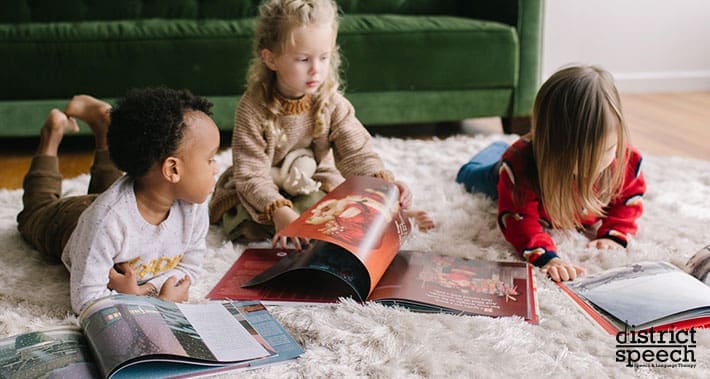
You’ve had a long, stressful day at work.
After you’ve rushed home to put dinner on the table and ensure everyone gets their homework done and does their chores, it’s now time for bed.
For many families, reading at bedtime is the best part of the day.
It’s when parents and children really get to spend some quality time together and connect over a story.
Reading is critical for developing your child’s speech.
Here at District Speech and Language Therapy, we’re all about helping kids develop the language skills they need to succeed in life.
Today, we’ll take a look at how reading to your child can help.
RELATED: What’s The Best Age To Begin Speech Therapy?
Can Reading Help Babies Before They’re Born?
A healthy pregnancy can do wonders for your child’s language skills.
This is why it’s more common to see certain speech issues in premature babies.
RELATED: Top Signs Your Child Has A Speech Disorder
But does this extend to your child’s future reading skills as well?
Some people claim reading to a child in the womb can have positive impacts, even before birth.
A 2013 study looked into whether there is actually merit to this claim.
In this study, pregnant people were given a recording of a made up word for their babies to listen to in the womb near the end of pregnancy.
When the babies were born, they could recognize the words and variations of them, showing that reading to children in the womb may actually be beneficial.
So if you’re an avid reader during pregnancy, consider reading your current literary love out loud.
Benefits Of Reading To Infants And Toddlers
Reading to children is incredibly important, even when they’re just infants and may not be able to understand the stories you’re telling them.
Let’s look at some of the advantages of reading to children and babies.
1. It Helps Build Social Skills
Hearing stories can help develop your child’s social skills.
Techniques such as making voices to differentiate characters, and changing the expression of your voice build emotional awareness in babies.
As well, the physical act of touching books and pointing at images in the book can help to promote social skills.
This can be particularly helpful for children diagnosed with neurological disorder, such as autism spectrum disorder.
RELATED: How Can Speech Therapy And Physical Therapy Help With Autism Spectrum Disorder?
2. It Teaches Them How Books, And Stories, Work
When you pick up a book, you seem to instinctively know how it works.
You open it from the front and read the words from left to right.
Although you may not remember it, you had to learn this somewhere.
Reading to children shows them how books work, which is key for reading later in life.
3. It Helps Them Learn About The World
As you read to your child, it’s inevitable they will stop you to ask questions.
They might point at a picture which they don’t recognize or stop you to ask about words they don’t know.
Being patient and taking your time when these questions come up not only helps your child learn about the world, it shows them it’s okay to ask questions about things they aren’t sure about.
Additionally, picture books can help nonverbal children get used to augmentative and alternative communication (AAC) methods.
RELATED: Understanding AAC For Nonverbal Autistic Children
4. It Helps Them Build Speaking Skills
As you read to your children, they are learning how to pronounce words.
Hearing you say them is a great way for them to learn how to say words, especially those which are longer or more difficult to pronounce.
Hearing the correct way to pronounce the words they see in the book can also help children develop their articulation skills.
Benefits Of Reading To Preschoolers
Children in preschool often cling to a favorite story or book they want over and over again.
Even though you might be getting bored of some books, it’s important to remember your children are still getting benefits from hearing the same story, even if it’s the 100th night in a row.
Let’s see what they are.

1. It Encourages Them To Learn To Read
The more you read to your children, the greater an interest they’ll have in finding stories and books to read on their own.
This is important as reading independently gives children the skills they need to build literacy.
RELATED How To Help Your Child Learn To Read.
2. It Helps Them Learn New Words
If you’ve ever accidentally said a “bad word” in front of your preschool aged child, you know they’re constantly learning new words and soaking up vocabulary from the world around them.
One of the most important ways children expand their vocabulary is through being read to.
3. It Helps Them Build Empathy
Stories introduce children to the points of views and experiences of people other than themselves, through the characters they are reading about.
Reading about characters with different backgrounds teaches them to view the world from perspectives they may not have considered.
In fact, this 2006 paper recommends storybooks as a tool for teaching children tolerance and acceptance for other cultures.
Tips For Reading Books To Your Child
Generally speaking, any reading to your child is better than not reading to them at all.
There are, however, some things you can do to make it a better and richer experience for both of you.
Keep reading for some tips.
1. Help Your Child Understand What They’re Hearing
Making links between the characters and stories in books, and what’s happening in your child’s life can help them to connect to the book, and offer a greater understanding of the books you read.
If something happens to a character in a book that’s similar to an experience your child has gone through, stopping to make that connection can help them to better understand what you’re reading to them.
2. Use Action Words
Take some time to talk about the pictures that go with the stories you’re reading.
Don’t just name the objects in the pictures, but use verbs, or action words, to describe what’s happening in the pictures – are characters walking or running or jumping?
Describing what’s happening in pictures can help to develop vocabulary.
3. Relate The Book To Their Own Experiences
Find ways to help your child to connect things which happen to characters in a book to their own life.
Building these understandings makes reading more fun and interesting.
4. Stress The Important Words
Certain words are more important than others to understand the meaning of a book or story.
Stressing important words may involve changing the pitch or speed of your voice so they are highlighted as something to pay attention to.
5. Think Beyond The Pages
Encourage your child to use deductive reasoning to guess what happens next, or to compare what’s happening in the book to situations they’ve faced in real life.
Doing this can help develop problem solving skills and imagination in your child.
Book Your Appointment With District Speech Today
Are you worried your child isn’t developing speech at the same rate as their peers?
Have they been diagnosed with a developmental disability which impacts their speech?
At District Speech, we can help.
Book your appointment with District Speech today.
1300 I St NW, Suite 400 E,
Washington, DC 20005
- https://g.page/districtspeech
District Speech and Language Therapy specializes in speech therapy, physical therapy, and occupational therapy solutions, for both children and adults, in the Washington D.C and the Arlington Virginia areas.